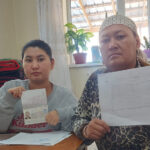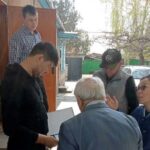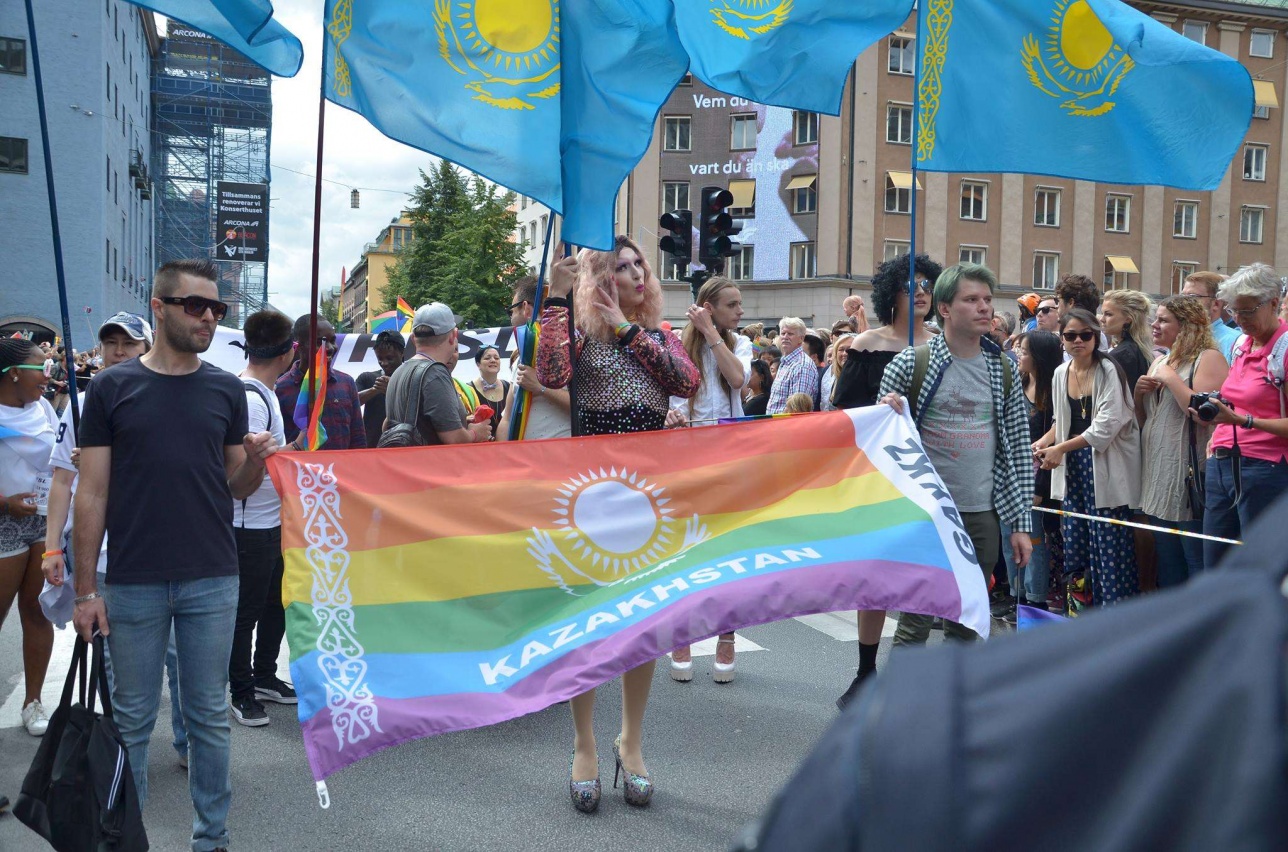Kazakhstan authorities sent a special envoy to Uzbekistan, who visited 29 imprisoned refugees extradited from Almaty to Tashkent in 2011.
Meeting in Tashkent prison
The international human rights organization “Fiery Hearts Club,” based in France, closely monitors the fate of 29 Uzbek refugees, who were extradited last year from Almaty, Kazakhstan, to Tashkent. In November 2012, Fiery Hearts Club’s source based in Uzbekistan reported that in June 2012 the Kazakh authorities sent to Tashkent a special representative, who met with all the extradited 29 Uzbek refugees in “Toshturma” (Tashkent prison).
“One person from Kazakhstan came here. But no one knows who came or from what organization. He met with all 29 refugees individually, on by one separately. The UN is allegedly putting pressure on Kazakhstan as the country’s authorities gave refugees to a country where torture is practiced. “Now go to Uzbekistan and check whatever condition of these people,” said the UN authorities in Kazakhstan,” says the source in Uzbekistan.
Convicted refugees tell about unbearable torture
However, the source says that in a conversation with representative of Kazakhstan no one of 29 refugees could tell about the brutal torture they face after their extradition to Uzbekistan.
“The representative of Kazakhstan asked them whether they were subjected to torture in Uzbekistan. But the Uzbeks side warned refugees saying that “if you complain, then blame on yourselves.” Therefore, all 29 people were forced to say that torture didn’t happen. Then the representative left, saying he would come back again. Although, all refugees brought to Uzbekistan faced horrific torture; they were subject to all kinds of torture, including an electric chair. Torture and inhuman treatment against them continues in prison. When passing foods for these refugees brought by their relatives, prison staff grinds up all products. Guys say that they had to confess everything because of torture. In the end, they were portrayed as criminals. They ask to inform UN about their situation, let the public know that they face horrible torture in prison,” says the source.
In June 2010, 29 Uzbek refugees were arrested in Almaty in the operation of Kazakh special services. They all were held in detention centers during one year. Later, the Kazakh authorities stated that the refugees had been detained at the request of the General Prosecutor and the Ministry of Internal Affairs of Uzbekistan, who accused them of very serious crimes in the country.
However, all the 29 refugees denied the charges and told reporters that they had been harassed by the Uzbek security services because of their religious beliefs.
It should be noted that all 29 men were very much afraid of extradition to Uzbekistan saying that they would be subjected to severe torture in case of extradition. Some even declared a hunger strike in detention centers in Almaty to protest the extradition. The security forces in Uzbekistan had questioned many of them before. Therefore, they knew firsthand about all the horrors in Uzbek prisons, especially against for Muslim prisoners.
However, despite this, in June 2011, just a year after their arrest, the Kazakh authorities sent all 29 Uzbek refugees to Uzbekistan. Many of the extradited refugees had been living in Almaty with their families, some had for three and four small children. Their families disappeared after their extradition. According to different reports, some women went to Uzbekistan after their husbands, and some have left for third countries fearing deportation to Uzbekistan.
The extradited refugees were sentenced to long years in prison in Uzbekistan. Their families told reporters that there were gross violations of rules during the court processes.
After the arrest 29 Uzbek refugees in Almaty, Mutabar Tadjibaeva, head the International Human Rights Organization “Fiery Hearts Club”, Talib Yakubov, Honorary President of the International Human Rights Society of Uzbekistan, and Kamoliddin Rabbimov, Uzbek political scientist and director of the Center for Political Studies “LIGLIS-CENTER”, created the “Committee for the protection of refugees.” The Committee gave all possible assistance to the families of extradited Uzbek refugees, and called on the Kazakh authorities, in particular on the president Nursultan Nazarbayev, with the request not to send these refugees to Uzbekistan.
With joint efforts of these representatives civil society the human rights organization ACAT-France (Association of Christians Against the Death Penalty and Torture), based in France, filed a complaint on behalf of 29 Uzbek refugees to the UN Committee against Torture, which sent a request to the government of Kazakhstan to suspend the possible extradition of Uzbek refugees in Uzbekistan.
After extradition of 29 Uzbek refugees to Tashkent, the UN Committee against Torture ruled that Kazakhstan had violated articles 3 and 22 of the international “Convention against Torture and Other Cruel, Inhuman or Degrading Treatment or Punishment” by extraditing these people to neighboring Uzbekistan. The UN Committee against Torture has also demanded that the Kazakh authorities provide appropriate protection to extradited Uzbek refugees, including their return to Kazakhstan, and compensation.
It is worth noting that many international human rights organizations has been reporting for many years that torture in Uzbekistan has a “systematic and widespread” nature.
Silence of the Kazakh authorities
Until today, the Kazakh authorities have not reacted publicly to the Committee against Torture. “Jarayon”s attempts to contact the prosecutor’s office in Almaty gave no results.
During the interview to “Jarayon”, Viktoriya Tyuleneva, employee of the Kazakhstan Bureau for Human Rights and Rule of Law, said that she had heard about Kazakhstan sending its representative to Uzbekistan in order to learn the condition of the extradited Uzbek refugees, in particular whether or not they were subjected to torture. However, the human rights activist said that she had no official confirmation of this.
“Visit of representative of Kazakhstan to Uzbekistan, indeed, related to the decision of the UN Committee against Torture made in June of this year. When considering complaints of Abdusamatov and others against the Republic of Kazakhstan, the Committee against Torture concluded that articles 3 and 22 of the Convention against Torture had been violated. In addition, in its ruling, the Committee found that Kazakhstan should provide additional information to the Committee on the merits of complaint, in particular the conditions of the applicants, within the next two months after decision was made.
Thus, the Committee ruled that Kazakhstan must check the condition of extradited people, which Kazakhstan did by sending its representative. They had to do this according to the decision of the Committee,” said Viktoriya Tyuleneva.
Several months passed since then Kazakh authorities sent its representative to Uzbekistan, journalists became aware of it only at the end of this year from their sources in Uzbekistan. To the question of “Jarayon” about Kazakh authorities’ reasons to conceal this information from public, in particular from human rights defenders, Viktoria Tyuleneva replied:
“I think that they do not hide it, because legally they are not obliged to inform the rights defenders about this. They are obliged to inform the Committee. It’s defenders work to “feel the pulse” and urge Kazakhstan to fulfill the Committee’s decision, literally “not leaving alone” the Kazakh authorities and constantly asking them uncomfortable questions like “what have you done for implementation of decision, in which you were found guilty?” As far as I know, the ACAT France, which filed a lawsuit on behalf of the extradited, monitors response to the decision of the Committee, and even sent a request to Navi Pillay, the UN High Commissioner for Human Rights, to raise the issue of implementation of the decision of the Committee during her meetings with Kazakh government during her visit to Kazakhstan in July 2012. Although, at the same time I understand and agree that Kazakh authorities would only benefit if they publicly acknowledged the Committee’s decision and voiced their steps in its implementation.”
But, according to Mutabar Tadjibayeva, head of the International Human Rights Organization “Fiery Hearts Club”, human rights organizations are not going to give up in the case of 29 Uzbek refugees.
“Human rights organization “Fiery Hearts Club” is very concerned about the fate of 29 refugees and their families. According to the monitoring, which our organization carries out in Uzbekistan, all 29 Uzbek refugees, who have been sentenced to long prison terms, constantly face torture. Based on this, we will appeal to the UN Committee against Torture, and ask them to demand from Uzbekistan and Kazakhstan, which are also members of the Committee, to report on the situation of extradited refugees, ” says Mutabar Tadjibayeva.
The international human rights organization “Fiery Hearts Club” is closely monitoring the case of 29 Uzbek refugees, and will inform the public about its findings through the publication of materials on “Jarayon” website.
At the moment, “Jarayon” is preparing a series of articles about the fate of 29 Uzbek refugees and their families.
SOURCE:
“Fiery hearts club” website
www.jarayon.com/en/index.php/human-rights/item/60-representative-of-kazakhstan-visited-29-uzbek-refugees-in-prison-of-uzbekistan

















